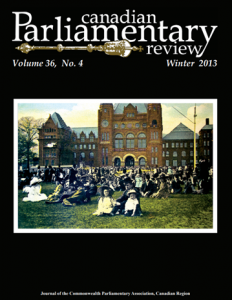Perspectives on the Election of Committee Chairs
The following is a revised and abridged version of the October 21, 2013 debate on MP Brad Trost’s private member’s motion (Motion No. 431) which proposes to instruct the Standing Committee on Procedure and House Affairs to: (a) consider the election of committee chairs by means of a preferential ballot system by all the members of House of Commons, at the beginning of each session and prior to the establishment of the membership of the standing committees; (b) study the practices of other Westminster-style Parliaments in relation to the election of Committee Chairs; (c) propose any necessary modifications to the Standing Orders and practices of the House; and (d) report its findings to the House no later than six months following the adoption of this order.
Brad Trost (Saskatoon—Humboldt, CPC):
Continue reading “Perspectives on the Election of Committee Chairs”

